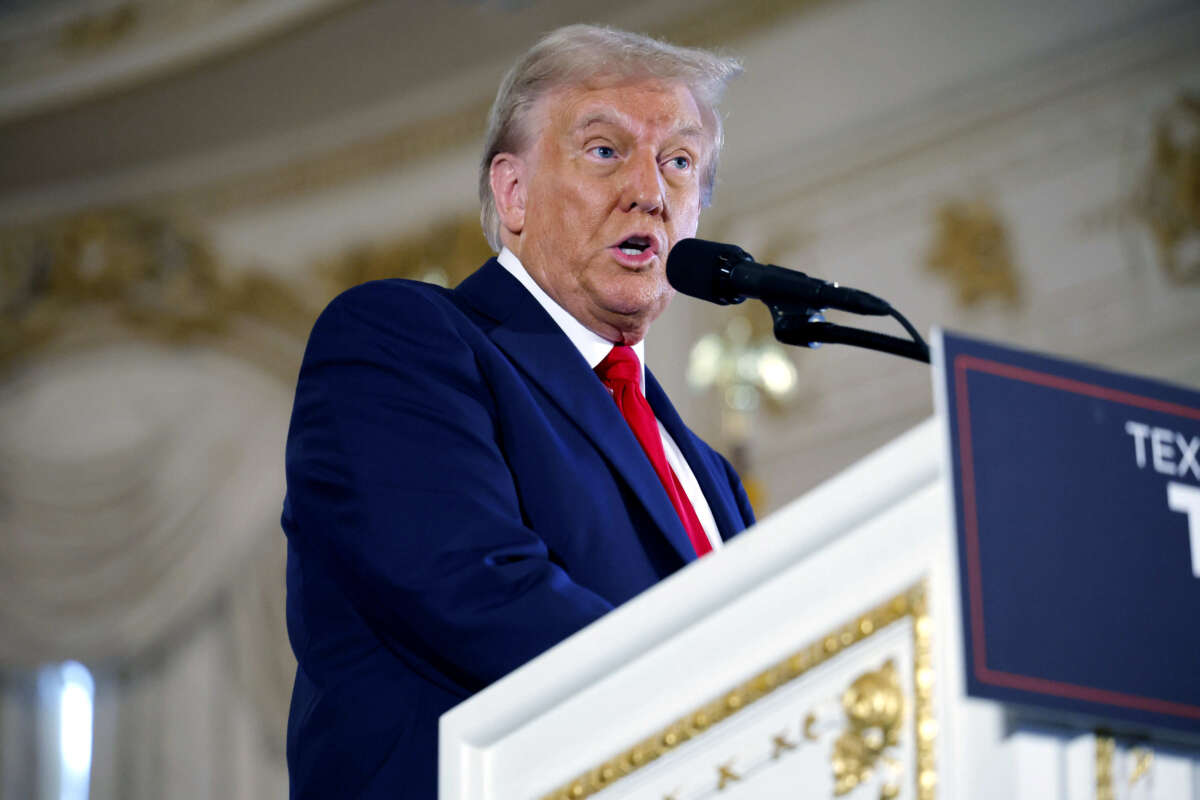Honest, paywall-free news is rare. Please support our boldly independent journalism with a donation of any size.
Former President Donald Trump, the Republican nominee for president in the 2024 election, is alleging, without evidence, that there has been widespread “cheating” during Pennsylvania’s early voting period — perhaps indicating that his campaign is planning to once again dispute the outcome of the election if he loses to Democratic candidate Vice President Kamala Harris.
Trump made the claim on his Truth Social website, urging his supporters to “REPORT CHEATING TO AUTHORITIES” and to demand that law enforcement “act NOW.”
“Pennsylvania is cheating, and getting caught, at large scale levels rarely seen before,” Trump wrote.
Trump did not specify what “cheating” was happening in the state, although loyalists to the former president are alleging that long lines and wait times at election sites in Pennsylvania — and lines for voting being cut off early each day — are resulting in Republican voters being disenfranchised.
The claims seem to be based on a mistake made at one voting site that has since been corrected. Local elections officials in Bucks County, where the miscommunication took place, rejected the notion that a widespread conspiracy against Republican voters was underway.
“Contrary to what is being depicted on social media, if you are in line by 5 p.m. for an on-demand mail-in ballot application, you will have the opportunity to submit your application for a mail-in ballot,” a social media account for the county government said.
The county added:
We are aware that, due to a miscommunication, individuals in line to apply for an on-demand mail-in ballot were briefly told they could not be accommodated. In fact, these voters were given the opportunity to submit mail-in ballot applications today.
Wait times at some voting locations have indeed been long, with some sites reporting delays of up to three hours. Those wait times are due to a Republican-passed state law in 2019 that requires “on-demand mail voting” longer than other states when it comes to early voting, as there are more steps for verification in person when a voter shows up early to cast their ballot.
Trump’s comments are the latest indication that he plans to contest the election results using false claims of election fraud should he lose — the same strategy he employed after losing the 2020 presidential election against Joe Biden. Trump’s other assertions of voter fraud during this election cycle have focused on claims that noncitizens are participating in some swing state’s elections — an occurrence that happens at a rate that is statistically insignificant, and that is caught in the rare instances it is attempted.
Fears that Trump may attempt to subvert the election results this year only grew after he gave a speech on Sunday evening at Madison Square Garden in New York City in which he alluded to secretive plans he has with Speaker of the House Mike Johnson (R-Louisiana) after Election Day.
“I think with our little secret we’re going to do really well with the House, right? Our little secret is having a big impact,” Trump said. “He and I have a little secret — we will tell you what it is when the race is over.”
The comments from the ex-president, who faces federal charges relating to his attempts to illegally overturn the 2020 election, set off alarm bells for many Democrats and progressive voters, as Trump could try to subvert the election by having his Republican allies in Congress dispute legitimate election results during the Electoral College certification ceremony on January 6, 2025.
Trump could be helped by election deniers in other ways. A study from the Center for Media and Democracy, for example, found that over 100 election administrators across eight swing states were skeptical or denied the 2020 results outright nearly four years ago, indicating they may try to do so again this year.
“Our democracy’s firewalls held fast in 2020, but election deniers and MAGA extremists have spent the last four years infiltrating election administration and political party positions in order to disrupt and cast doubt on the 2024 election results,” read a statement from Arn Pearson, director of the Center for Media and Democracy, back in September.
Voters across the country are keenly aware that Trump may once again try to subvert the election. According to an ABC News/Ipsos poll from August, only 29 percent of voters believe Trump will accept the results even if he loses. Two-thirds of voters (67 percent) believe Trump won’t accept the outcome if Harris wins.
Media that fights fascism
Truthout is funded almost entirely by readers — that’s why we can speak truth to power and cut against the mainstream narrative. But independent journalists at Truthout face mounting political repression under Trump.
We rely on your support to survive McCarthyist censorship. Please make a tax-deductible one-time or monthly donation.
